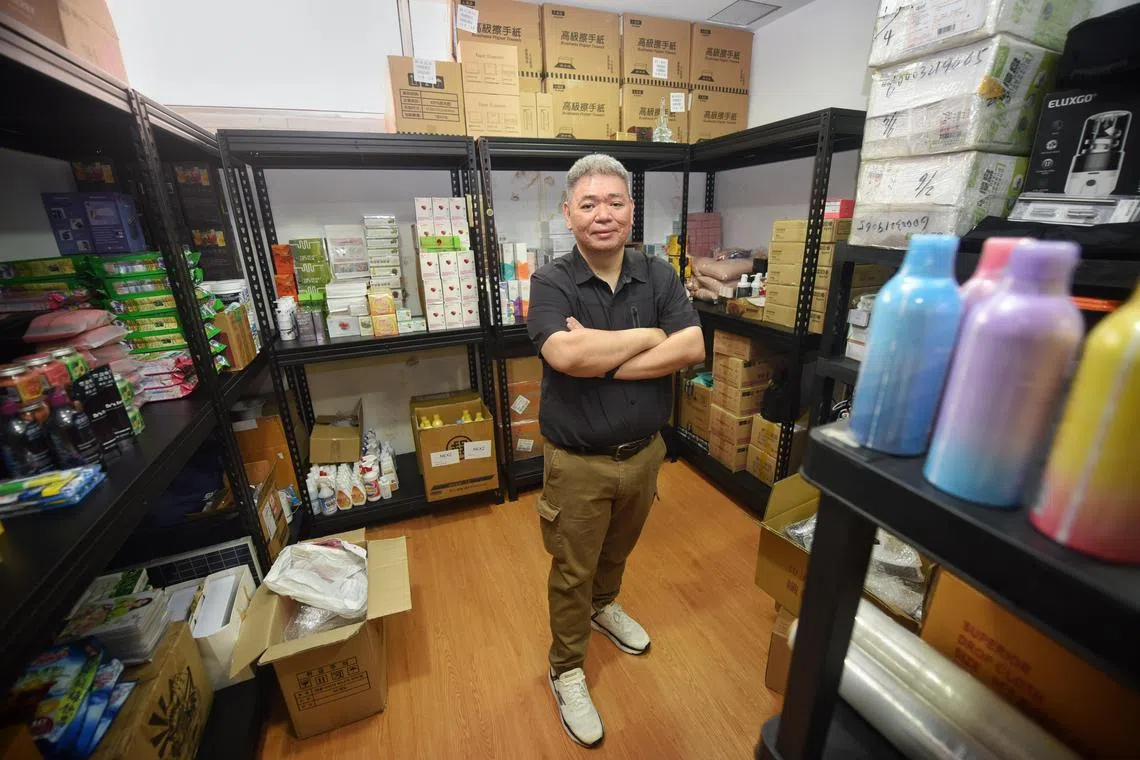A lucrative trade for some, online live-stream shopping takes off in Singapore
Sign up now: Get ST's newsletters delivered to your inbox

Mr Patrick Low (second from right), who runs 10 live-stream platforms, has roped family members in to help, including (from left) his daughter-in-law Evangeline Calista, his son Ryan Low and his wife Tan Siew Hua.
ST PHOTO: GIN TAY
Follow topic:
SINGAPORE - As the live-streaming trend gains ground, entrepreneurs such as Mr Patrick Low are seizing the opportunity to harness its potential for sales.
Often clad in a T-shirt and bermudas on camera, the 47-year-old charms his audience with his brand of charisma and quick wit, from the moment he hits the “live” button on his mobile phone.
“Hello, good morning! Please help to like and share,” says Mr Low, at the start of one of his streams promoting mostly health supplements but also skincare products such as sunscreen mists.
Viewers, whom he greets by name, type their comments and send animated red hearts and thumbs-up symbols popping up from the bottom of the video feed.
To Mr Low, live streams are not just about a sales pitch, he told The Straits Times, but an opportunity to forge a connection with each viewer at every session, seven days a week.
As the comments pour in, he effortlessly juggles answering questions with extolling the virtues of the product, creating an atmosphere that feels more like a virtual hangout than a shopping channel.
When it is time to get down to business, Mr Low seamlessly transitions into sales mode, unleashing a torrent of deals like “buy one, get one free” and promoting “must-have” products such as a heart of palm vegetable supplement.
Viewers who want to buy a product type its code into the comment field and pay through real-time payment system PayNow or a bank transfer.
With the potential to generate tens of thousands of dollars in just a couple of hours, live-stream selling has emerged as a lucrative venture, attracting a myriad of entrepreneurs, actors and entertainers eager to cash in.
Some 45 minutes into his live stream on March 25, Mr Low had more than 1,000 views. It is not uncommon to receive hundreds of orders to the tune of over $10,000 in a typical two-hour session like that one, he said.
The venture is so lucrative that Mr Low, who used to set up makeshift stalls at HDB markets to sell household items, now runs 10 live-stream platforms from 9.30am to 1.30am on a typical day. He has roped in family members to help, and hires live streamers to sell the products.
Not every live-stream seller is as successful as Mr Low. Most struggle to gain traction, facing challenges such as building an audience and standing out amid a sea of sellers.
But for anyone who wants to try their hand at social commerce, there is no lack of opportunity, with social media platforms like Facebook and TikTok hotbeds for live-streaming events.
TikTok, in particular, saw the gross merchandise value (GMV) of its TikTok Shop Singapore Live grow four times in the second half of 2023 over the same period in 2022, said its spokesman. Gross merchandise value is the total value of goods sold on a platform or marketplace over a specific period.
Overall, the Live GMV accounted for the majority of the total GMV on TikTok Shop SG, said the spokesman.
A market report on researchandmarkets.com noted that the social commerce industry in Singapore is poised to grow significantly over the next five years. It estimated the gross merchandise value from social commerce will increase from US$1.2 billion (S$1.6 billion) in 2023 to reach US$8.47 billion (S$11.4 billion) by 2029.
Social commerce is a shopping experience that takes place over social media through social networks and digital media.
In the highly interactive format, live streamers sell an array of products from fashion and beauty essentials to electronics, household goods, and even big-ticket items such as cars.
Mr Low, who started his live-streaming business in 2020 selling household items, said he now focuses mainly on health supplements.
“How many mops can a person buy? But, with health supplements, viewers will buy more, not just for themselves, but for their friends and families,” said Mr Low, who buys his products from Taiwan, China, South Korea, Japan and Hong Kong.
Aside from small consumer goods, people will also buy experiences. Ask Ms Reshel Chan, better known as the host of Taitaigram, who sells tour packages.
The 49-year-old used to work as a tour manager for agencies such as Chan Brothers Travel and SA Tours. Before the Covid-19 pandemic, she headed the customer service team at Chan Brothers.
“I started conducting live streams in October 2020, just sharing about my travel stories. When the borders opened, I started organising tours,” said Ms Chan.

Ms Reshel Chan, better known as the host of Taitaigram, sells tour packages via live streams.
ST PHOTO: HENG YI-HSIN
In 2023, Ms Chan sold 10 tours to European countries like Germany, Spain and Switzerland, as well as Japan, Bhutan and South Africa, at prices starting from $5,000.
Her smallest group numbered six travellers who each paid between $9,888 and $13,988 for a six-day trip, travelling business class to Bhutan in December 2023. Her largest group had 30 people, whom she took to Greece in September 2023.
Ms Chan works with licensed agencies to deliver the tours she designs and receives a commission from the agencies for the packages she sells.
On tour, Ms Chan live-streams her travels to viewers.
“Live streaming may be a lucrative business for many, but for me, the most rewarding part is receiving messages from viewers who tell me how much they enjoy my live streams because they are not able to travel due to illness,” said Ms Chan, who also sells products such as scarves and health supplements.
AI-created avatars
With live-streaming shopping thriving, entrepreneur Kevin Zhang, founder of marketing consultancy firm The Celeb Net, saw a chance for celebrities to ride on the trend.
Using artificial intelligence (AI), on idoLive, he creates digital avatars of celebrities that they can use to take on more brand endorsements.

Using AI, entrepreneur Kevin Zhang creates digital avatars of celebrities that they can use to take on more brand endorsements.
ST PHOTO: NG SOR LUAN
Mr Zhang said: “Live streaming is definitely in demand. One or two hours of selling could easily bring in five-figure sales revenues, and the live streamer would take 30 per cent from it. In a way, this market is quite big. The problem is a lack of good host.
“And the cost is quite high to use a celebrity, who commands a fee of between $2,000 and $8,000 for one hour.”
But with AI avatars, essentially online “clones” of themselves, celebrities can increase their engagements with brands and audiences, as brands pay the same price of between $2,000 and $8,000 to use the avatars for live streams for a month, said Mr Zhang.
Mr Zhang also launched the Get AI Right movement to establish his firm’s commitment to responsible AI practices, such as indicating on the video that viewers are seeing digital avatars.
“Or we can have the avatars say at the beginning of the video that they are AI avatars of the celebrities,” said Mr Zhang.
Some local celebrities including Li Nanxing, Vivian Lai, Gurmit Singh, Julie Tan, Vincent Ng and Shane Pow, unveiled their AI avatars on March 22.
Mr Li said: “Artistes have limited time for live streaming. With AI avatars, we can conduct live streaming at different places on different platforms. We can even take on overseas assignments without being there physically.”

Local celebrities Vivian Lai and Li Nanxing with their AI avatars.
ST PHOTO: NG SOR LUAN
Mr Li acknowledged that with the industry evolving so rapidly, it is important for artistes to adapt and stay relevant.
“Many people are buying from live streams, whether it is out of convenience or they really need the products or just to support the hosts. However, live streamers may not have the stamina to conduct multiple long sessions, but with AI avatars, there is no limit. It can work round the clock,” he added.
Who are the big spenders?
Mr Wisley Yip, 47, general manager at a skills training centre, spends about $5,000 a month buying seafood and health supplements from live streams.
Mr Yip, who is single, said he makes bulk purchases of health supplements for himself and to give to friends who cannot afford them.
Nicknamed Xia Dan Ge, meaning “purchase order bro” in Mandarin, Mr Yip has become a regular customer on Mr Low’s platforms.
“I started with buying seafood from Wang Lei’s live streams,” said Mr Yip, referring to the getai singer. “I continue to buy because I find the quality good and prices reasonable.”

Mr Wisley Yip with all the items he had bought from live streams. He keeps the items in the storeroom of a cafe he owns at Textile Centre.
ST PHOTO: HENG YI-HSIN
Another buyer, Mr Tony Chan, spends about $4,000 each month on health supplements.
The 49-year-old businessman in the construction industry said he and his wife enjoy watching live streams for entertainment and find it convenient to shop from the comfort of their home.
Mr Chan said he likes the diverse content and engaging banter from live streamers.
He follows Patrick Low, Wang Lei, Misshopper, Taitaigram and Malaysia platforms Oasis Live Mall and Wow Live Mall.
Hairstylist Yuki Chong, 48, confesses to an addiction to live-streaming sales, admitting that she can spend between $300 and $400 in each session.
“I used to watch live-streaming sales every day, and I would always buy something at every live stream – from dried goods, seafood, clothes to health products. It’s quite addictive,” said Ms Chong, adding that she tries not to watch too many now, to control her buying.
When other viewers buy the products, it feels like an endorsement, and it is then hard to resist the temptation to do the same, she admitted.
This emotional connection and sense of community inside a live stream can increase the urge for impulse buying, said an expert.
Clinical psychologist from mental health company Intellect, Ms Tan Jit Hui, pointed out that live-streaming sales tap into emotions such as excitement, anticipation and the fear of missing out.
The real-time interaction, limited-time offers and exclusive deals create a sense of urgency and thrill, prompting viewers to make purchases to satisfy their immediate desires, said Ms Tan.
Additionally, the social influence within live streams, including peer pressure, host influence and community engagement, further encourages consumer spending. Hosts create a sense of trust and belonging within the audience, added Ms Tan.
“Live-streaming sales are particularly interactive – not just between the consumer and the host, but also between the consumer and other viewers of the live stream... When one person in the community makes a purchase (which can be seen through comments and in-app prompts), others might perceive this as a form of endorsement for the product, and hence, it encourages buying behaviour,” said Ms Tan.
The jury is still out on whether live-stream selling is a passing fad, but Mr Low believes it is here to stay.
“It’s not just sales pitches; it’s about entertainment too,” he said.


